Gold prospecting has been a pursuit of wealth and adventure since the days of the California Gold Rush. With the shimmering allure of finding gold, many wonder if this age-old activity still holds value today.
Whether you're drawn by the thrill of the hunt or the potential financial gain, this comprehensive guide will explore the ins and outs of gold prospecting in the modern era.
As an avid prospector, I can tell you that prospecting for gold has been one of the most fulfilling hobbies I've had! I was lucky to be living in the heart of the gold country in Northern California. It's been said that over 80% of the gold is still remaining in rivers, mines, and maybe even in your backyard, depending on where you live. With the right gear and patience, Gold Prospecting is certainly worth it!
I can honestly say, every time I went out propspecting, I found gold. Whether it was metal detecting in the high sierra rivers or just panning in gold country, gold always ended up in my pocket! With careful research, hi tech gear, and a little luck, you too can find gold. Give it a try, you won't regret it!
The Historical Allure of Gold Prospecting
The first gold rush set a precedent for the feverish hunt for precious metals. From the California Gold Rush to other historic gold mining districts, the dream of striking it rich has driven countless individuals to pan for gold.
These events have not only shaped history but also planted the seed of curiosity for future gold prospectors.
Modern-Day Gold Panning: A Recreational Activity
Recreational gold prospecting has become a popular hobby for many. With a simple gold pan and a sense of adventure, enthusiasts head to creeks and rivers, hoping to find gold flakes or even sizable nuggets. It's a fun way to connect with nature and history, and who knows, you might just come across a hidden treasure worth top dollar!
The Financial Aspect: Is There Enough Gold?
When asking, "Is gold prospecting worth it?" one must consider the potential financial return. While finding gold can be profitable, it's important to manage expectations. The spot price of gold is high, but it takes a significant amount of gold dust, flakes, or nuggets to see substantial monetary gain.
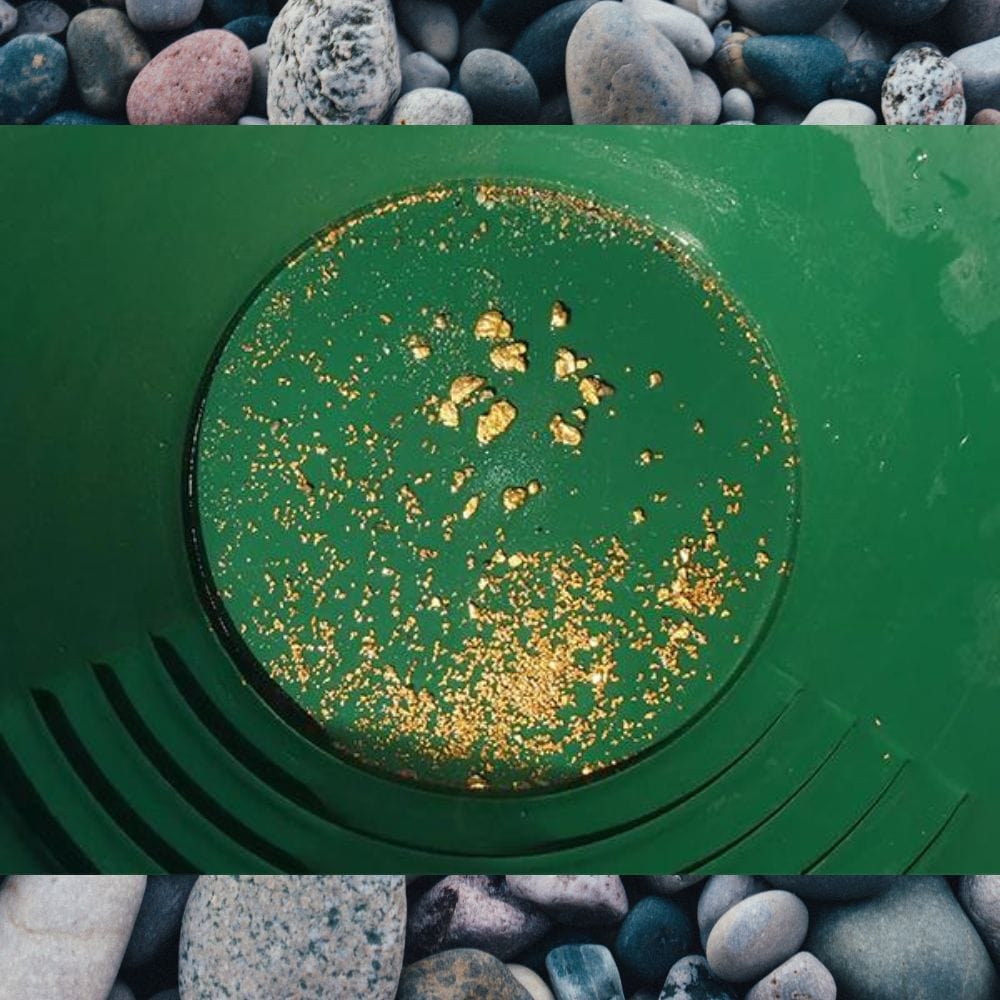
Gold Recovery Techniques and Equipment
Successful gold recovery requires the right techniques and mining equipment. From gold pans to sluice boxes and metal detectors, the tools you choose can greatly impact your success. Experienced prospectors often use a combination of methods to extract gold from creek beds and other material.
Understanding Gold Bearing Areas
Not all areas are created equal when it comes to finding gold. Geological surveys and historical records can point you to virgin ground or areas where gold has been found a century ago. Knowing where to look is half the battle in gold prospecting.
The Role of Research in Finding New Gold Deposits
Before you start prospecting for gold, research is key. Studying maps of active mining claims, historical gold rushes, and geological features can lead you to promising gold bearing areas. This preparation can make the difference between a fruitful search and a fruitless one.
The Legalities of Gold Prospecting
Prospecting for gold isn't just about finding a spot and starting to pan. You must respect private property and understand land management regulations. Whether it's public land or private land, ensure you have the proper permissions and understand the rules of recreational mining.
Environmental Considerations and Gold Dredging
Gold prospecting can have environmental impacts, especially when it comes to gold dredging and the use of big equipment. It's crucial to prospect responsibly, adhering to regulations that protect the environment and ensuring that mining activities do not cause undue harm.
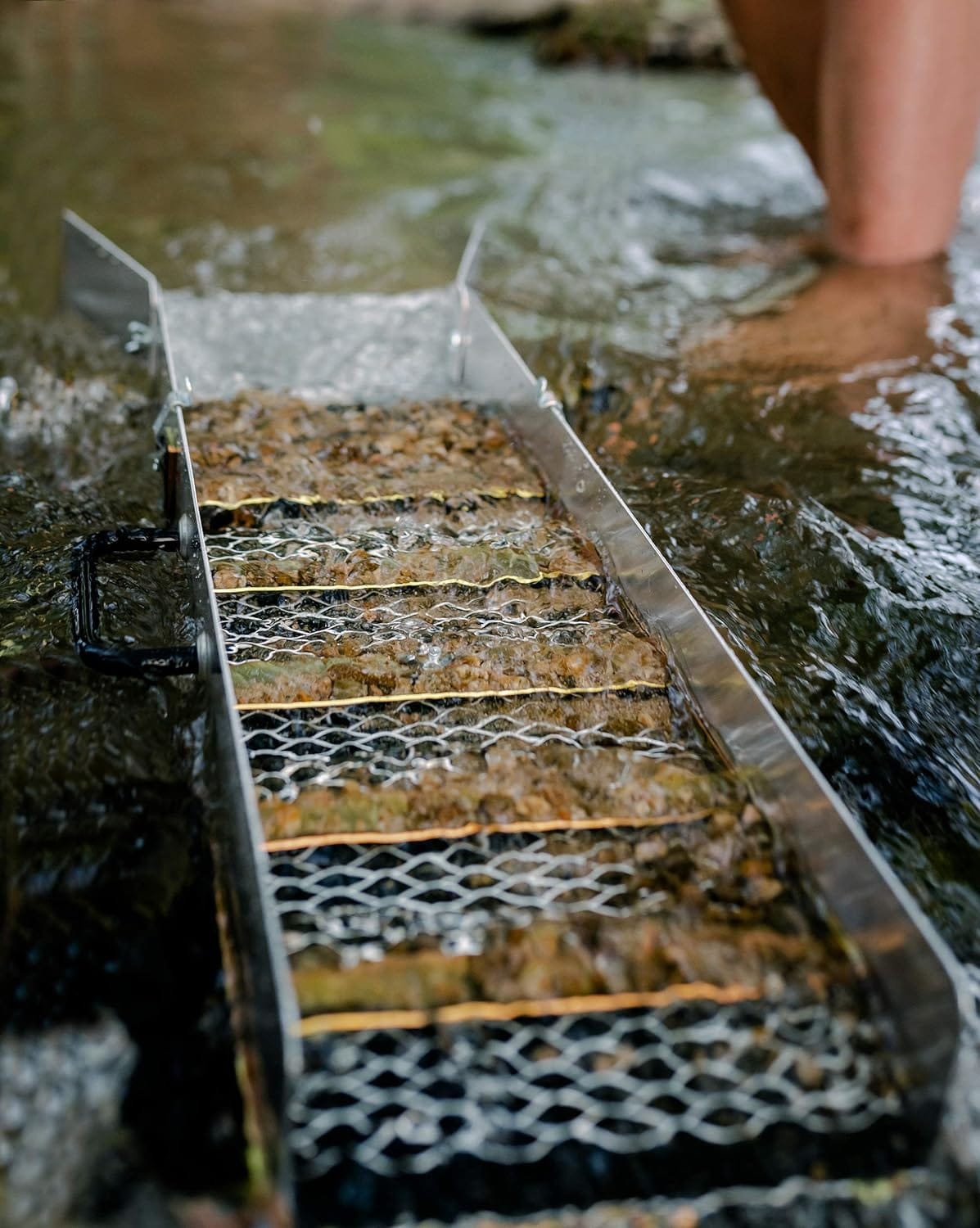
The Excitement of Finding Real Gold
There's an undeniable thrill when you find real gold. Whether it's tiny flakes or more substantial pieces, the excitement of discovery is a big part of what makes gold prospecting worth it for many. I can't tell you how excited I was the first time I saw gold in my pan! Gold Fever truely exists!
It's the modern-day equivalent of a treasure hunt, with the added bonus of potentially finding something of real value. The Technological Edge: Metal Detectors in Gold Prospecting Metal detectors have revolutionized the way gold prospectors approach their quest for treasure.
These sophisticated devices can sense metallic objects, such as gold nuggets, deep within the ground, providing a significant advantage over traditional panning methods.
For the low key modern gold prospector, a metal detector is an indispensable tool that can lead to discovering more gold in less time. It's not just about covering more ground; it's about maximizing the efficiency of the hunt and increasing the odds of striking it rich.
The use of metal detectors in gold prospecting is not just limited to scanning vast areas. They are particularly useful in pinpointing the exact location of gold nuggets amidst the black sand and other minerals found in a creek bed or in the vicinity of old gold mines.
This precision saves time and effort, allowing gold panners to focus their energy on extracting the gold rather than sifting through large amounts of sediment. With the right equipment, prospectors can navigate through the "noise" and zero in on the signals that indicate the presence of gold.
Staking a Claim: The Business of Gold Claims In the world of gold prospecting, owning a gold claim is akin to holding a piece of the mother lode. A gold claim grants the holder the exclusive right to mine for gold on a particular piece of land.
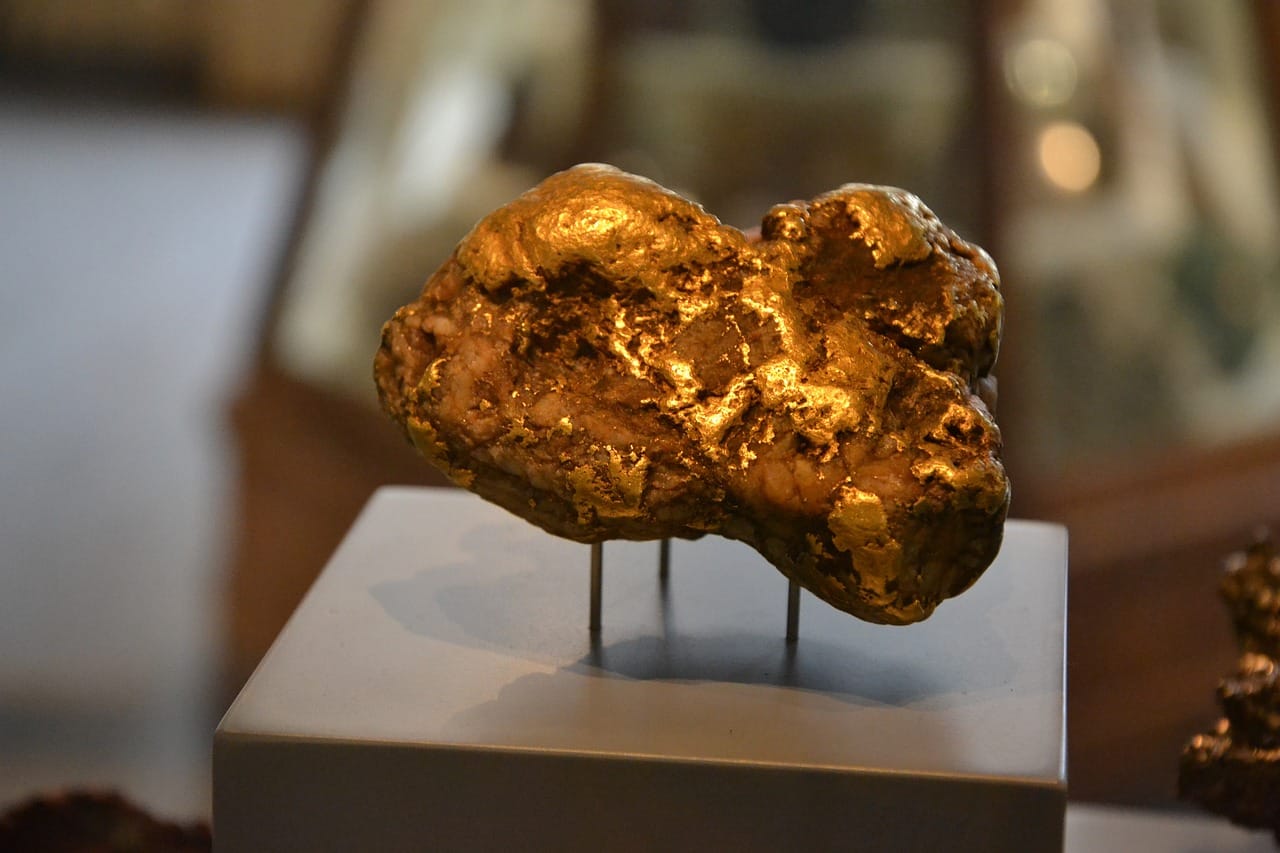
This legal designation is crucial for both recreational prospectors and mining companies, as it secures the claimant's investment and efforts in the search for gold. For those serious about prospecting, acquiring a good ground with a proven history of placer gold can be the first step towards a profitable endeavor.
However, securing a gold claim is not as simple as staking a flag in the ground. There are legal processes and paperwork involved, and the prospector must ensure that all the gold they find is within the boundaries of their claim.
This can involve negotiations with landowners, government entities, and sometimes other prospectors. It's a competitive aspect of gold prospecting that requires knowledge of both mining law and the local geography.
Despite the challenges, owning a claim can be a game-changer for those committed to finding gold and willing to navigate the complexities of mineral rights. The Thrill of Discovering a Gold Nugget Gold prospecting can often feel like a treasure hunt, and the ultimate prize is the discovery of a gold nugget.
These naturally occurring pieces of native gold are rare and can vary in size from small grains to sizable chunks. The excitement that comes with unearthing a gold nugget is unparalleled, as it's a tangible piece of success that can sometimes be worth a lot of money.
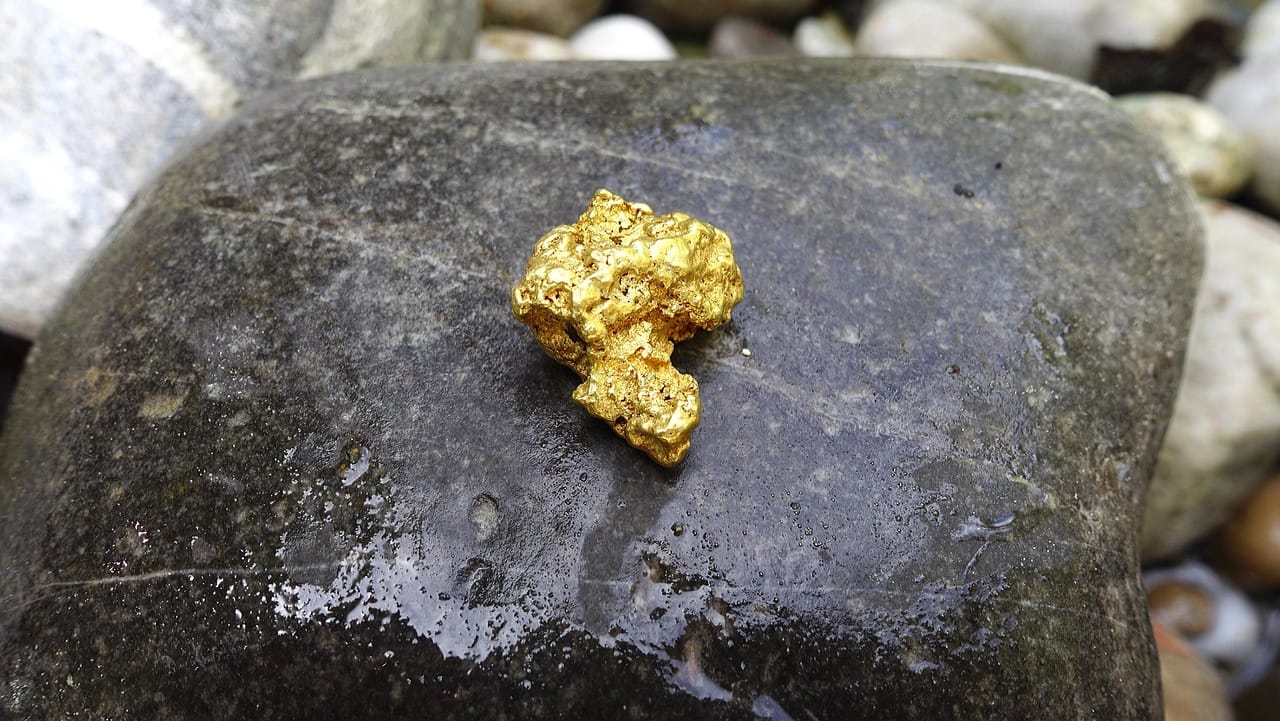
Prospectors often recount their first nugget find with a sense of nostalgia, as it marks a significant milestone in their journey.
Finding such things as gold nuggets requires not only skill but also a bit of luck. While metal detectors are a common tool in the prospector's kit, especially in areas known for larger nuggets, the experience of finding one is not guaranteed.
The rarity of nuggets makes them highly sought after, and their value extends beyond their weight in gold. They are often kept as specimens, sold to collectors, or even made into jewelry, each nugget with its unique shape and story.
Exploring Old Mines and Hard Rock Prospects Venturing into old mines can be an exciting aspect of gold prospecting. These abandoned sites can sometimes be treasure troves for those who know what to look for.
However, exploring old mines comes with significant risks, such as unstable tunnels and the presence of toxic gases. It's crucial for prospectors to prioritize safety, often requiring specialized training and equipment to navigate these hazardous environments properly.
Hard rock mining, which involves extracting gold from solid rock, is another method used by some prospectors. Unlike panning or sluicing, which typically involves placer deposits, hard rock mining targets the source of the gold itself.
This can be a more labor-intensive and costly process, but for those who undertake it, the potential rewards can be substantial. It's a testament to the prospector's dedication to the craft, as they delve deep into the earth's crust in search of the precious metal.
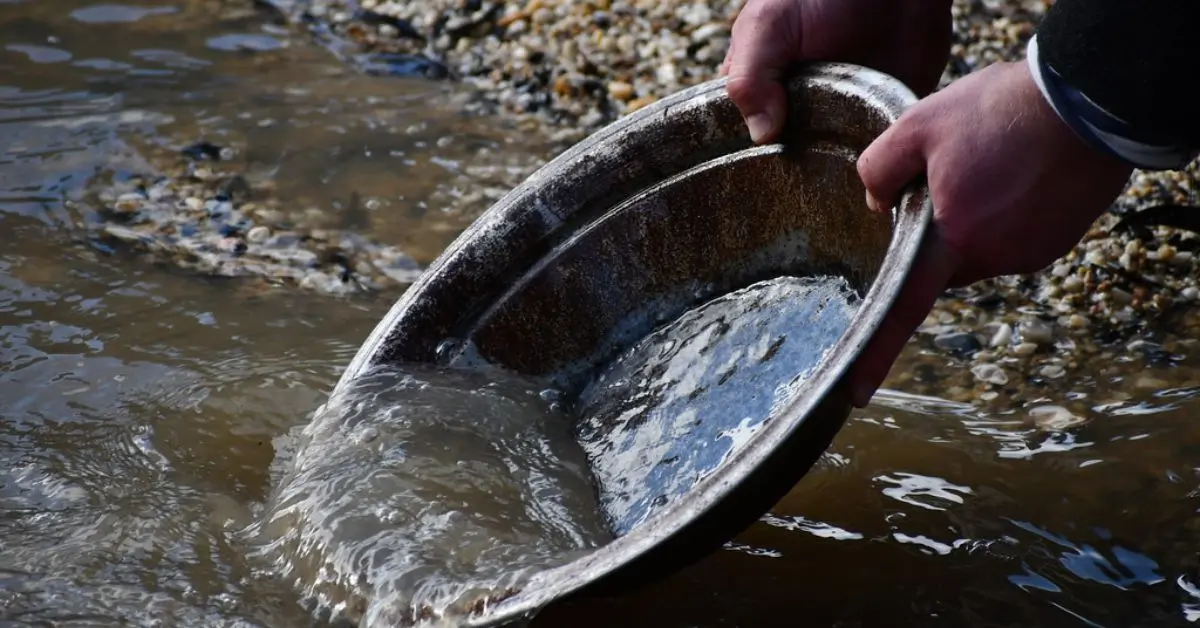
Technological Advancements in Gold Prospecting The quest for gold has been revolutionized by technological advancements, making it more accessible and efficient for prospectors. Modern-day gold hunters are equipped with sophisticated metal detectors, GPS mapping tools, and data analysis software that can significantly increase the chances of striking gold.
These high-tech devices can detect gold at greater depths and pinpoint locations with higher accuracy than ever before. As a result, the process of gold prospecting has become less about luck and more about strategic exploration.
In addition to detection technology, advancements in extraction and processing equipment have also improved. Prospectors can now utilize portable gold trommels and highbankers to process larger volumes of sediment, increasing the potential yield from a gold mine.
These innovations not only enhance the prospecting experience but also contribute to a more sustainable approach by reducing the environmental impact of mining operations. The integration of technology in gold prospecting is a game-changer, offering a blend of traditional thrill and modern efficiency.
The Psychological Rewards of Gold Prospecting Gold prospecting isn't just about the monetary gains; it's also a pursuit that offers significant psychological rewards. The thrill of the hunt and the potential for discovery tap into the human love for adventure and mystery.
For many, the act of searching for gold provides a sense of purpose and a break from the monotony of daily life. It's an activity that requires focus, patience, and resilience, qualities that can lead to personal growth and satisfaction beyond the value of any found treasure.
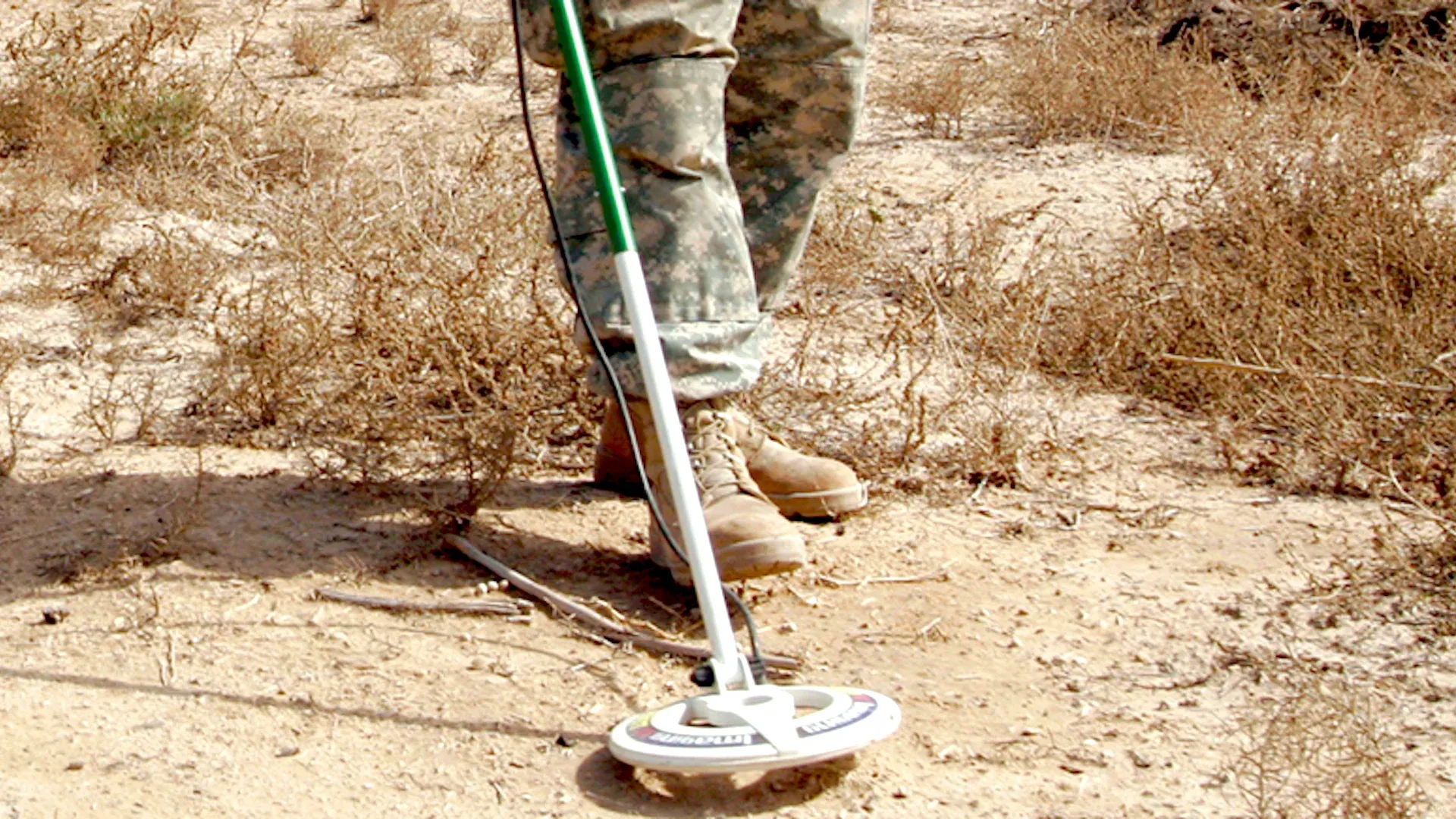
Moreover, the camaraderie and shared experiences within the prospecting community create a sense of belonging and support. Whether it's exchanging tips with fellow enthusiasts or celebrating a new find, the social aspect of gold prospecting can lead to lifelong friendships and a strong sense of connection.
This emotional and social enrichment is often what keeps prospectors returning to the streams and fields, eager to continue their quest for gold and the joys that come with it. Technological Advancements in Gold Prospecting The relentless march of technology has not left the realm of gold prospecting untouched.
Innovations in detection equipment and data analysis are revolutionizing how prospectors approach the hunt for this precious metal. Sophisticated metal detectors, ground-penetrating radar, and GPS mapping tools have increased the efficiency and success rates of modern prospectors.
These high-tech gadgets allow for deeper and more precise scanning of the earth, unveiling gold deposits that were once beyond reach. As a result, enthusiasts equipped with these advanced tools are redefining what it means to be a gold prospector in the 21st century.
Moreover, the integration of software for geological modeling and the use of drones for aerial surveys are contributing to more strategic prospecting endeavors.
By harnessing the power of aerial imagery and geospatial data, prospectors can now analyze vast areas without setting a foot on the ground, pinpointing potential gold-bearing zones with greater accuracy.
This technological leap not only maximizes the chances of discovery but also minimizes the environmental impact by reducing unnecessary digging and disruption.
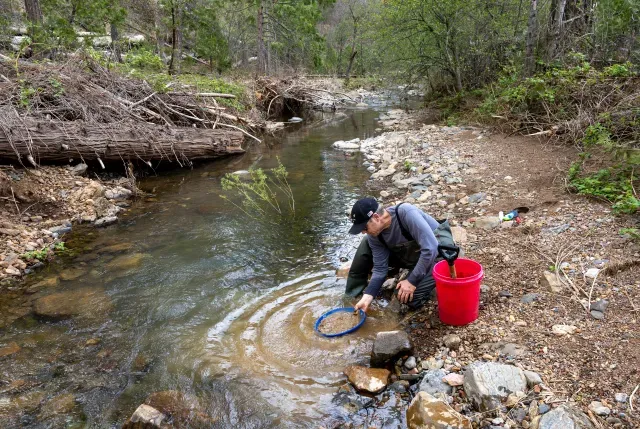
The blend of traditional prospecting methods with cutting-edge technology is creating a new era of gold hunting, filled with excitement and potential.
The Psychological Rewards of Gold Prospecting Beyond the tangible value of the precious metal itself, gold prospecting offers a wealth of psychological benefits that attract individuals to this age-old pursuit.
The thrill of the chase and the possibility of unearthing hidden treasures provide a unique form of excitement and adventure that is hard to find in other hobbies. For many, the act of searching for gold is a meditative experience, offering a chance to disconnect from the digital world and reconnect with nature.
The anticipation of the 'eureka' moment creates an adrenaline rush that keeps prospectors returning to streams and wilderness areas, spade in hand.
Additionally, gold prospecting can be a deeply rewarding social activity. It fosters a sense of community among like-minded individuals who share tips, stories, and experiences. This camaraderie is often cemented through local prospecting clubs, online forums, and group outings.
The shared joy of a new find or the collective commiseration when the gold seems elusive strengthens bonds between participants. Whether one strikes it rich or simply enjoys the outdoor experience, the psychological rewards of gold prospecting enrich the lives of those who partake in this enduring quest.
Technological Advancements in Gold Prospecting Gold prospecting has been revolutionized by technological advancements, making it more efficient and less labor-intensive.
Modern prospectors are equipped with high-tech metal detectors, GPS mapping tools, and sophisticated panning equipment that can significantly increase the chances of striking gold. These devices can detect gold at greater depths and in more challenging terrains than traditional methods, allowing prospectors to explore areas that were previously inaccessible or deemed unprofitable.
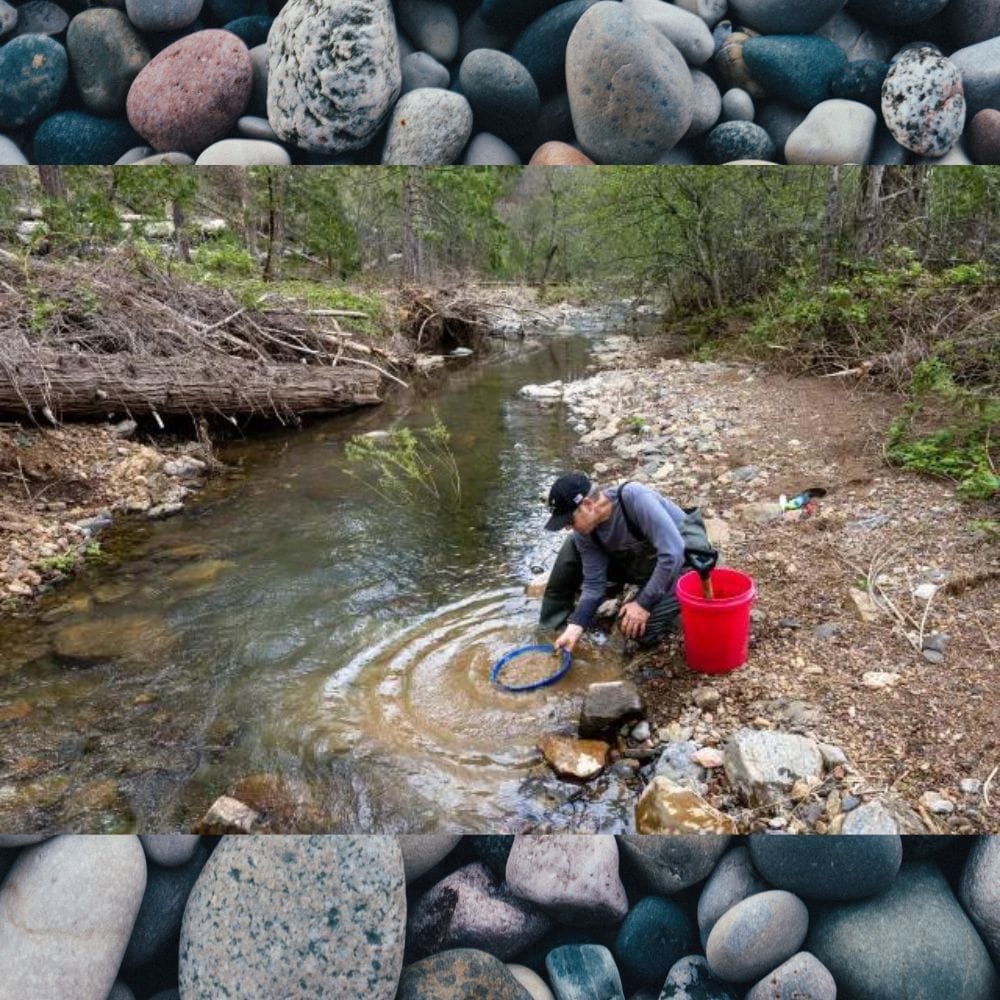
The integration of technology not only streamlines the search but also enhances the overall experience by providing real-time data and analytics.
The use of drones is another innovative approach that has taken gold prospecting to new heights. Drones can survey large areas quickly, identifying potential gold-bearing zones without the need for physical presence.
They can capture high-resolution images and generate topographic maps that help prospectors pinpoint the most promising locations. This aerial perspective is particularly useful in remote or rugged landscapes where traditional surveying would be difficult and time-consuming.
By embracing these technological tools, gold prospectors can maximize their efficiency and increase their chances of success.
The Psychological Rewards of Gold Prospecting Gold prospecting isn't just about the potential financial gain; it also offers psychological rewards that attract enthusiasts to this age-old pursuit.
The thrill of the hunt and the possibility of discovering something valuable create a sense of adventure and excitement that is hard to replicate in other activities. For many, the search for gold is a way to escape the routine of daily life and connect with nature.
The anticipation of unearthing a nugget or flakes of gold can be a powerful motivator, driving prospectors to persist in their endeavors despite the odds.
Moreover, gold prospecting can be a deeply meditative and therapeutic activity. The repetitive motions of panning and sifting through materials allow individuals to focus their minds and find a sense of calm and mindfulness.
This can be particularly beneficial for those seeking a respite from the stresses of modern life. The satisfaction derived from discovering even the smallest speck of gold is immense, reinforcing the prospector's efforts and providing a unique sense of accomplishment.
For many, the true value lies in the journey and the experiences gained along the way, rather than the gold itself.
Is Gold Prospecting Worth It?
The Community of Gold Prospectors
Gold prospectors often share a sense of camaraderie. Joining a community of gold miners can enhance the experience, offering opportunities to learn from more experienced prospectors and share in the excitement of new finds.
Prospecting Techniques: From Panning to Sluicing
Mastering various prospecting techniques can increase your chances of success. Gold panning is the most basic method, while using a sluice box allows you to process more material. Each technique has its own learning curve, but all can be rewarding.
The Importance of Patience and Persistence
Gold prospecting is not a get-rich-quick scheme. It requires patience, persistence, and a willingness to learn. Many spend hours panning or sifting through large rocks and black sands before finding any gold, but for those who stick with it, the rewards can be worth the effort.
The Economics of Gold Prospecting
To determine if gold prospecting is worth it, one must consider the economics. The cost of mining equipment, travel, and time must be weighed against the potential value of gold found. For some, the experience itself is worth more than any gold that might be discovered.
The Impact of Gold Spot Prices
The fluctuating spot price of gold can influence the value of your finds. When gold prices are high, even small amounts of gold can be quite valuable. Keeping an eye on market trends can help you decide when it's the best time to sell any gold you've recovered.
Gold Prospecting as an Educational Experience
Gold prospecting isn't just about the potential financial gain; it's also an educational experience. Learning about geology, history, and the environment can be incredibly enriching, making gold prospecting a worthwhile endeavor for the knowledge it imparts.
Is Gold Prospecting Worth It?
The Adventure and Lifestyle of Gold Miners
The lifestyle of gold miners is one of adventure and exploration. For those who love the outdoors and the prospect of discovering something new, gold prospecting can be an ideal pastime. It's a way to escape the routine and immerse yourself in the pursuit of precious metals.
The Risks and Challenges of Gold Prospecting
Gold prospecting comes with its own set of risks and challenges. From navigating old mine shafts to dealing with the unpredictability of natural gold deposits, prospectors must be prepared for the obstacles they might encounter.
The Future of Gold Prospecting
As technology advances and new gold deposits are discovered, the future of gold prospecting looks bright. With continued interest and the lure of finding gold, prospectors will likely continue to pan for gold for years to come.
Some Final Thoughts
Gold prospecting is a multifaceted activity that can be both financially rewarding and a fun way to spend time outdoors. Once you find your first gold flake or nugget, trust me you'll be hooked! While it's not a guaranteed path to riches, for many, the real worth lies in the adventure, the learning experience, and the chance to uncover hidden treasure.
With the right tools, equipment, and knowledge, gold prospecting can indeed be worth it and many people can even make a living prospecting for gold. Right now when gold is more than $2000 an ounce and there are more prospectors than ever! get out ther and give it a try!
Stuff You Need To Know!
Here at TopRatedStuff.com the outdoors is our home. We offer comprehensive reviews on all outdoor gear, sporting goods, and many other top rated products. If you’re a Camper/Backpacker/Fisherman, we’ve got you covered!
If you’re into Tennis/Golf/Pickleball, we’ve got everything you need including informative tutorials and informational articles. Maybe you’re a Prospector/Miner?
We’ve got all the gear you need to get started and many great articles that will help you succeed! We read through countless reviews online and only talk about the best rated top selling products so you can skip all the research and purchase whatever it is you’re looking for, quickly and efficiently!
Thanks Again for checking out our site and we hope you come back and visit us for any of your purchases! Natures gym is always open! Find your Zen outside!
FAQ's
How much can I expect to make from gold prospecting?
The amount of money you can make from gold prospecting varies widely. It depends on the quantity and quality of gold you find, the current spot price of gold, and the costs associated with your prospecting efforts. The more equipment and research, the more money!
Do I need a claim to prospect for gold?
In many areas, you do need to have a claim or the permission of the claim holder to prospect for gold. Always check local laws and regulations before beginning your prospecting activities.
Is gold prospecting a viable full-time job?
For most people, gold prospecting is more of a hobby than a viable full-time job. However, there are some who manage to make a living from it, particularly those who are highly skilled, knowledgeable, and in areas with rich gold deposits.
What equipment do I need for gold prospecting?
Basic equipment includes a gold pan, shovel, and classifier. More advanced tools like metal detectors and sluice boxes can enhance your prospecting efficiency.
How likely am I to find gold while prospecting?
Success varies widely depending on factors such as location, geological conditions, and your skill level. While some prospectors strike it rich, others may find minimal amounts or none at all.
Is gold prospecting legal, and where can I do it?
Gold prospecting is legal in many areas, but regulations differ by jurisdiction. Research local laws and obtain necessary permits before prospecting. Public lands, such as national forests and Bureau of Land Management areas, often allow prospecting with certain restrictions.
What are the costs associated with gold prospecting?
Costs include equipment purchases, travel expenses, permit fees, and potentially lodging and meals. It's essential to budget for these expenses and consider them in evaluating the profitability of prospecting.
Are there risks or challenges involved in gold prospecting?
Yes, prospecting involves physical exertion, exposure to the elements, and potential hazards like wildlife encounters or accidents. Additionally, there's no guarantee of finding significant amounts of gold, making it a speculative endeavor. Proper safety precautions and realistic expectations are crucial.
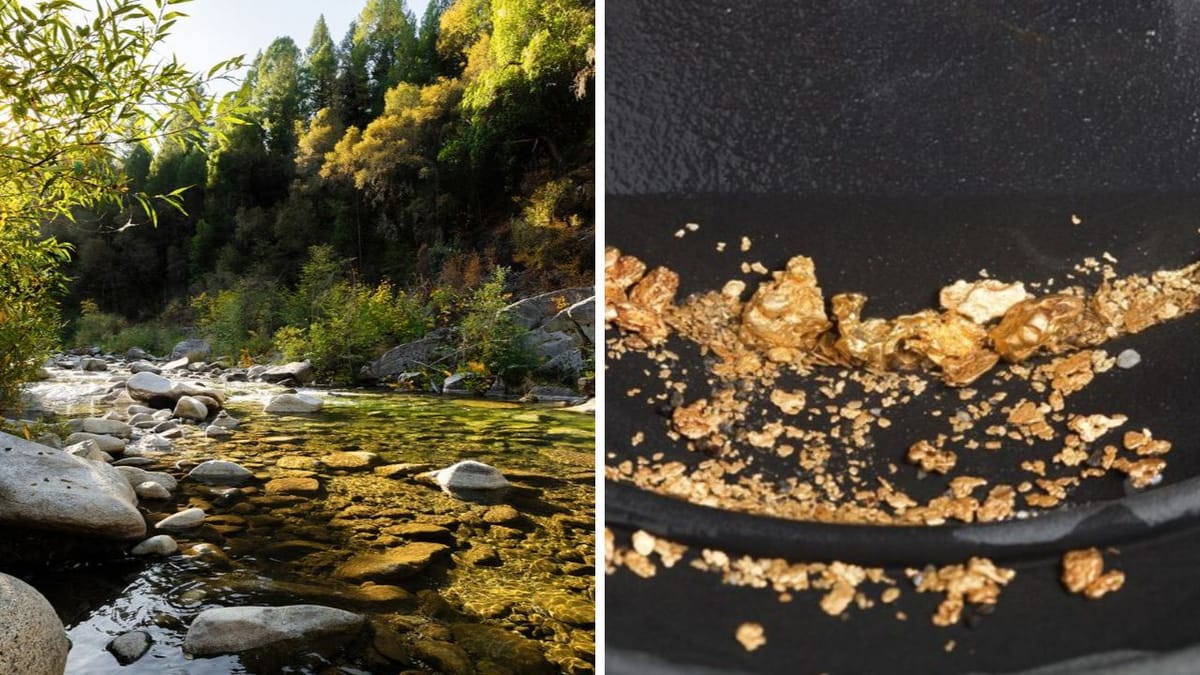

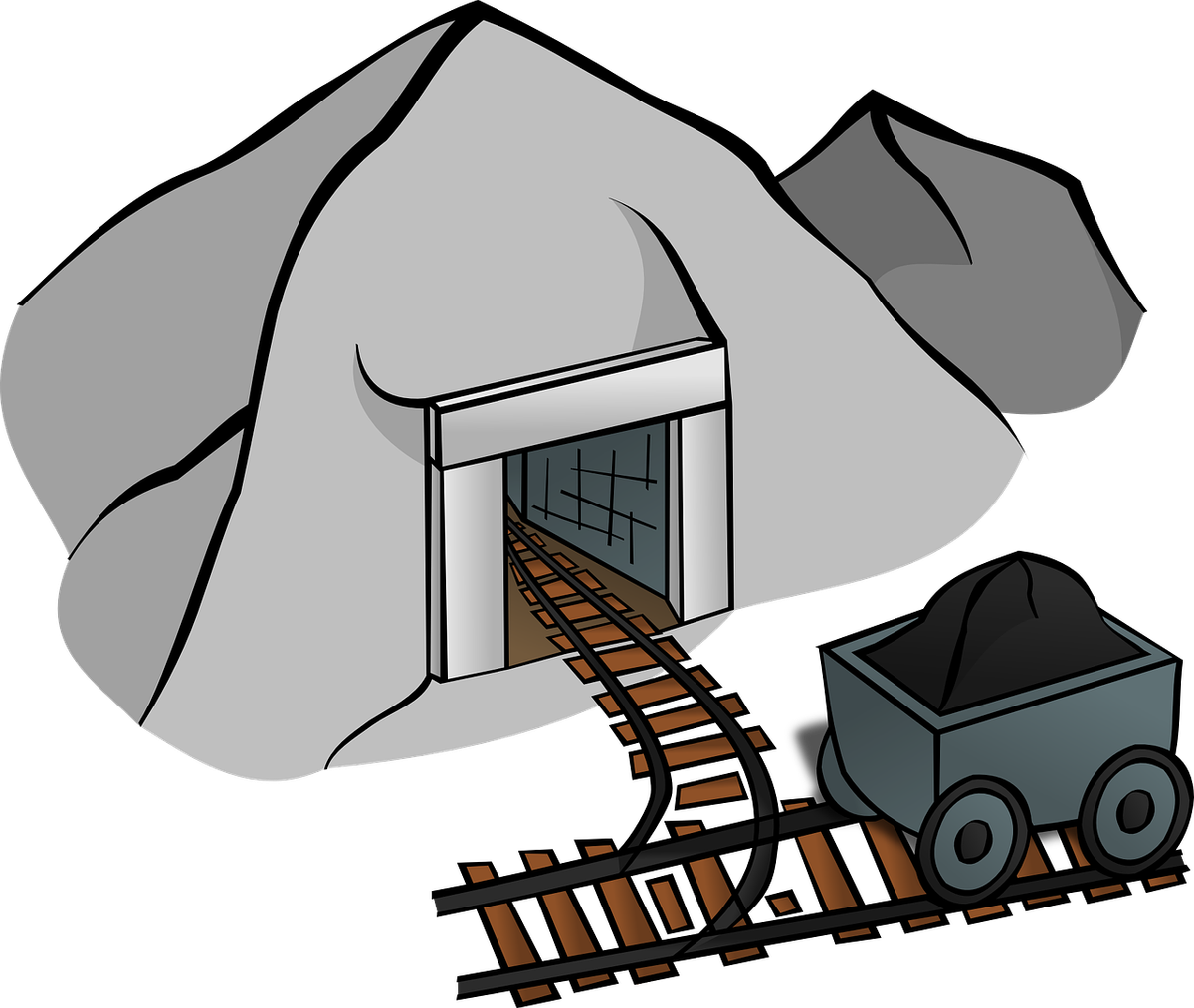












Member discussion